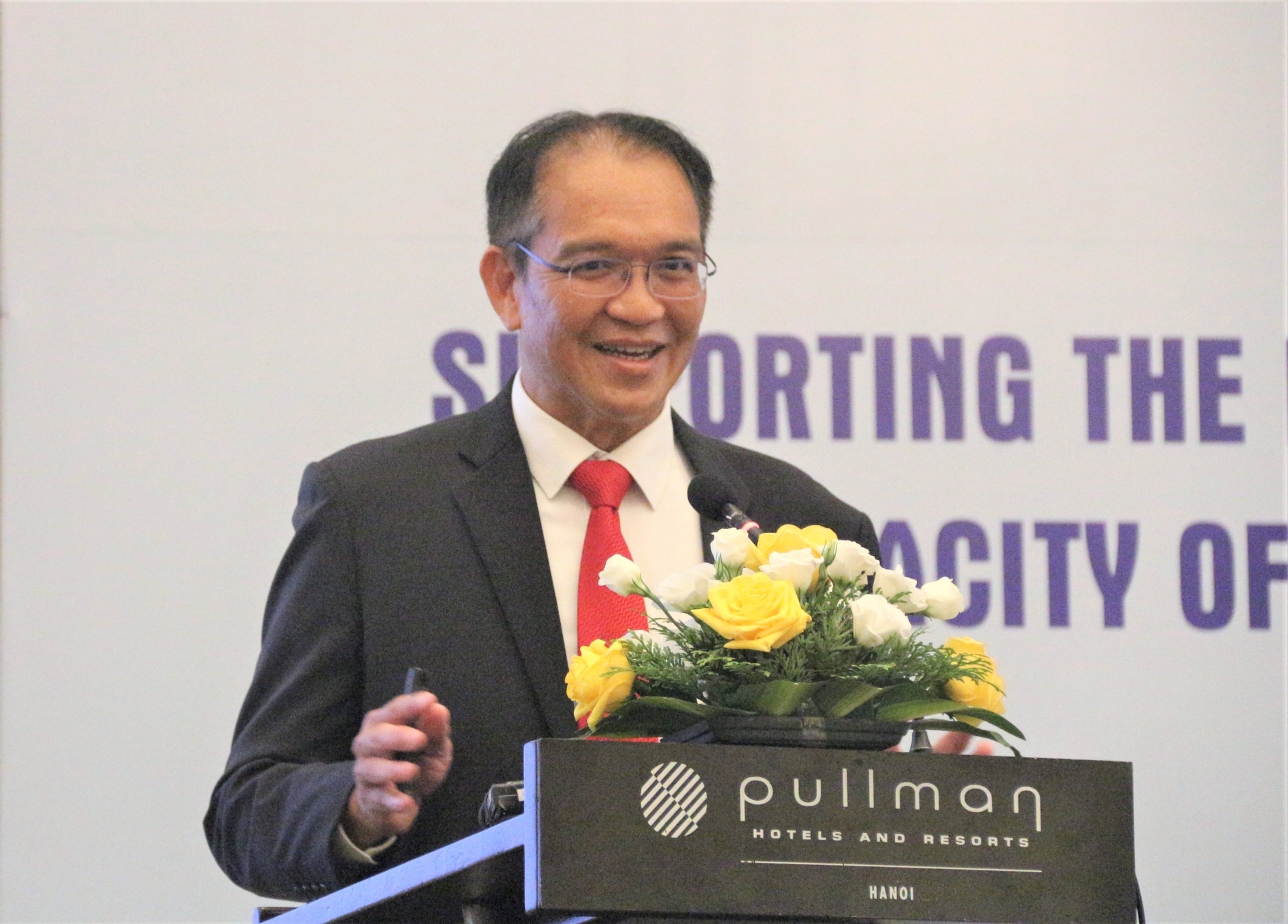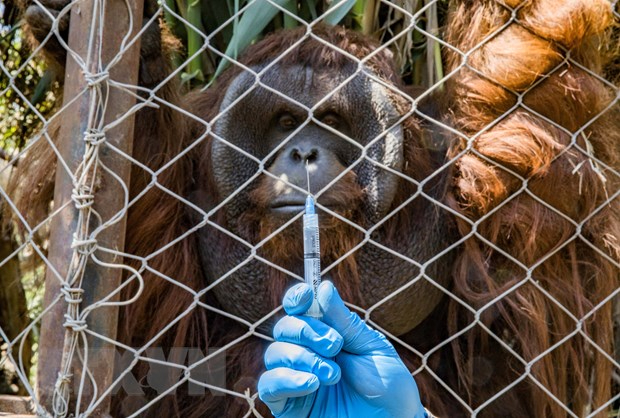November 28, 2025 | 01:49 GMT +7
November 28, 2025 | 01:49 GMT +7
Hotline: 0913.378.918
November 28, 2025 | 01:49 GMT +7
Hotline: 0913.378.918
The “Consultation meeting to support the implementation of the roadmap for strengthening the management capacity of Vietnam's services in Vietnam, 2021-2030” is held on June 23.
Mr. Pawin Padungtod, Senior Technical Coordinator, Emergency Center for Transboundary Animal Diseases (ECTAD), discussed the accomplishments of the past as well as the work of the Vietnam Ministry of Agriculture and Rural Development and FAO in Vietnam, as well as the potential collaboration that the two parties would pursue to further develop the animal health and veterinary services system in Vietnam.
According to Mr. Pawin, ECTAD plans and executes emergency and development programs for animal health in order to prevent and mitigate the impact of disease using the One Health approach.
"We have been training animal health professionals all over the world, enhancing laboratory capacity, generating and collecting surveillances to support disease control interventions, and also facilitating One Health cooperation, collaboration, and communication," Pawin stated.

Mr. Pawin Padungtod, Senior Technical Coordinator, Emergency Center for Transboundary Animal Diseases (ECTAD) shared at the meeting.
Since 1978, when Vietnam joined FAO, the organization has collaborated with Vietnam on nutrition and rural development, among other issues. Additionally, the organization develops consultations with a variety of stakeholders to support MARD in critical areas.
There are three technical areas, including One Health, the response to climate change, food safety, and other concerns.
In Vietnam, the program is entirely committed to the One Health philosophy in order to develop the capacity to enhance animal disease response and biodiversity conservation, etc.
Sharing about FAO's choice of the One Health approach as the main strategy to implement the Safe Asia Project for the Global Environment (SAFE), Dr. Pawin said, the One Health program is an effort to collaborate to optimize human health and the environment. The health and well-being of humans, animals, and ecosystems are interrelated and interdependent.
Accordingly, the One Health program can solve many problems such as sustainable livestock development, antibiotic resistance, emerging diseases, or potential pandemics in the future.
Vietnam's veterinary capacity has been bolstered over the course of more than a decade by FAO's training of animal health and One Health specialists through a number of programs. Vietnam would enhance the surveillance workforce, field epidemiology, diagnostic protocols and instruments, and quality assurance in the area of animal disease detection and response, with the objective of increasing farmers' income and decreasing antimicrobial use.
In addition, FAO and the Vietnamese government collaborate to prevent and combat serious maladies such as African Swine Fever, Lumpy Skin Disease, and Highly Pathogenic Avian Influenza (HPAI).
Under the framework of Veterinary service system development 2021 – 2030, according to the FAO representative, Vietnam can manage and control animal and zoonotic diseases through active surveillance that seeks to expand target species and facilities as well as sampling and testing innovation. Enhance biosecurity, preparedness, and disease prevention and control capacities.
Vietnam monitors food safety by revising legal frameworks for food systems, enhancing assessment of food systems control, enhancing food safety testing capacity, and monitoring animal products.
In addition, it is crucial to improve food safety communication through food safety awareness education using the One Health approach.

Regarding the administration of veterinary drugs and vaccines, Mr. Pawin emphasized the importance of monitoring veterinary drug quality, antimicrobial use in diets, and veterinary prescriptions.
Animal health information management systems, such as the Vietnam Animal Health Information System (VAHIS), aquatic diseases reporting system, linkages with data systems i.e. livestock, captive wildlife, and online service system on quarantine of animal and animal products; slaughter management; veterinary hygiene, food safety inspection, drug management, and veterinary statistics must be utilized to achieve the aforementioned objectives.
According to Pawin, cross-border collaboration is important. In an interview with VAN, Pawin shared that to minimize the risk of emerging diseases and also minimize the transmission of any disease from wildlife to humans, there are a few things that every country can do.
"We have a consortium of the UN agency, many UN agencies, development partners, and also NGOs that have been working on wildlife we agree on four key recommendations that we would like to suggest.
We have brought this issue up to the government of Vietnam earlier as well.
First of all, I think we need to foster public understanding of the risk that wildlife can pose to public health. I think with COVID-19, I think the public is well aware of the possibilities of emerging diseases that can seriously impact have serious public health impacts throughout the world.
And that helps. But you see, I think we need to create a deeper understanding of how the risk comes into existence and how the public can help minimize those risks of disease emergence and transmission.
Secondly, we talked a little bit about the illegal wildlife movement. I think there is a need to impose stricter control, as you suggested earlier, to close down any illegal wildlife operations.
So those include procession, transportation, and also selling – those illegal operations need to be stopped in order to minimize contact with the human. And again, these illegal operations, we consider these illegals risk because usually there is no monitoring.
We don't know what happens or we don't know what species is involved. And there are so many unknowns. The third one is to assess the risk of those that are still legal, and to assess what species and practices could increase the risk of disease emergence and transmission.
So this is exactly what the Safe Project, the collaborative project between UN ODC, UN Environmental Program, and FAO conducting in Vietnam is doing, is to help generate evidence for assessing the risk of what species and what practice could increase the risk of disease emergence and transmission from wildlife to human in Vietnam.
And then we can design the intervention to manage this risk. This may include also improving or regulating biosecurity practice that is required for keeping wildlife in captivity, for example."

(VAN) On November 27, in the meeting with Minister Tran Duc Thang, Mayor Yin Yong shared Beijing’s experience to improve environment and air quality.

(VAN) After 30 years, both sides identified strategic areas of cooperation: sustainable production, increasing coffee value and training for farmers.
/2025/11/27/4910-4-164708_294.jpg)
(VAN) On the afternoon of November 27 in Beijing, Minister of Agriculture and Environment Tran Duc Thang held a working session with several major Chinese enterprises operating in the agriculture and environment sector.

(VAN) The Department of Animal Health issued a provisional guideline requesting local authorities to increase surveillance, collect samples for testing, and conduct epidemiological investigations according to the established procedure.

(VAN) The United Nations recommends that Vietnam utilize data and artificial intelligence to enhance early disaster warnings and reduce GDP losses by 3.2% in the context of climate change.

(VAN) On the morning of November 27 in Beijing, Minister Tran Duc Thang and the Deputy Commissioner General of the General Administration of Customs of China signed a protocol on fresh jackfruit exports.

(VAN) As floodwaters recede, a vast network of irrigation works across eastern Gia Lai is emerging in a state of severe disrepair, with extensive damage demanding urgent restoration ahead of the 2025-2026 winter-spring cropping season.